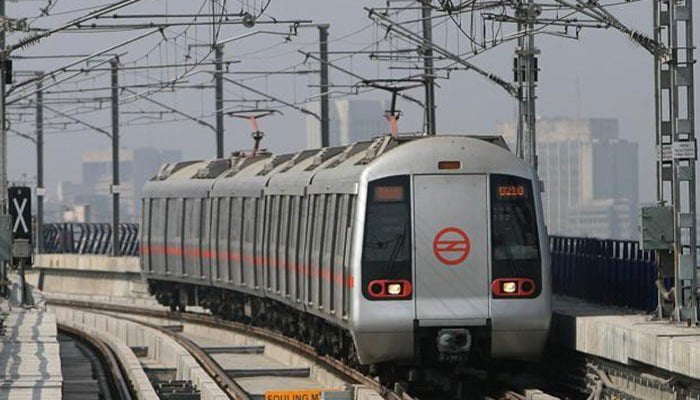New Delhi: A driverless Delhi Metro train on the Magenta line on Monday crashed into a wall during a trial run at Kalindi Kunj depot in the city.
The accident occurred at 3.40 PM (1540hrs) at the Kalindi Kunj Metro depot, said DMRC. There were, however, no casualties.
The DMRC asserted it will have no bearing on December 25 launch, which is to be inaugurated by Prime Minister Narendra Modi.
“A trial train was moved from the workshop without testing the brake system as a result of which, while the train was moving up the ramp for washing, it rolled back and hit the adjacent boundary wall. No person was injured in the incident,” read a statement from DMRC.

The Managing Director of DMRC, Mangu Singh, has ordered a high level enquiry into this incident by a committee of three officers of the rank of Executive Directors.
“Prima facie, it appears to be a case of human error and negligence and appropriate action will be taken after the enquiry,” read the statement from DMRC.
Mangu Singh, said that “main line operations on this line are absolutely safe, with a high level of automation and has been thoroughly checked and cleared by the commissioner of metro rail safety for passenger operations ”
“Today’s incident was a manual error during maintenance and has nothing to do with the trials or passenger safety during future operations,” he said.
The Delhi government, meanwhile, also sought a report from the DMRC on the incident with Transport Minister Kailash Gahlot tweeting: “Shocking lapse! There can be no compromise on passenger safety.”
The DMRC and the Delhi government are engaged in a running feud over the recent rise in commuting fares. The Arvind Kejriwal government continues to insist that the fare hike should be rolled back.
The first leg of the project that is being inaugurated this Christmas was scheduled to be operational by December 2015. Trial runs between the Kalindi Kunj and Kalkaji Mandir section of the Magenta Line started in August 2016.
Phase 4 of the Delhi Metro is also caught in delays. The cost required is likely to increase by Rs 6,000 crore as the Centre and the Delhi government are yet to decide whether Japan International Cooperation Agency (JICA) will be the funding agency or not. Additionally, DMRC will have to prepare detailed project reports afresh for the new phase by involving private players, mandated under the new Metro policy.
A spokesperson of DMRC said that 2500-3000 people travel on a single Metro. The 12.64-km section, part of metro’s upcoming Botanical Garden-Janakpuri West (Magenta) Line, was granted safety approval by the Commissioner for Metro Rail Safety (CMRS) last month.
Metro’s new generation trains, which can run without drivers, will operate on this section where an advanced Communication Based Train Control (CBTC) signalling technology that will facilitate movement of trains with a frequency of 90 to 100 seconds will also be pressed into service.
However, for an initial period of two-three years the trains will have drivers.
Currently, those travelling to south Delhi have to change have to change trains at Mandi House Metro Station.
After the new section is opened, commuters will be able to travel directly to Kalkaji Mandir Metro Station, which is on the Violet Line, cutting travel time by about 45 minutes.
Once the entire corridor from Botanical Garden till Janakpuri West (38.23 km) is operational, commuters from Noida will be able to go to Gurgaon by changing trains at Hauz Khas.
The Botanical Garden station has been developed as Delhi Metro’s first-ever inter-change station outside the boundaries of Delhi.

















